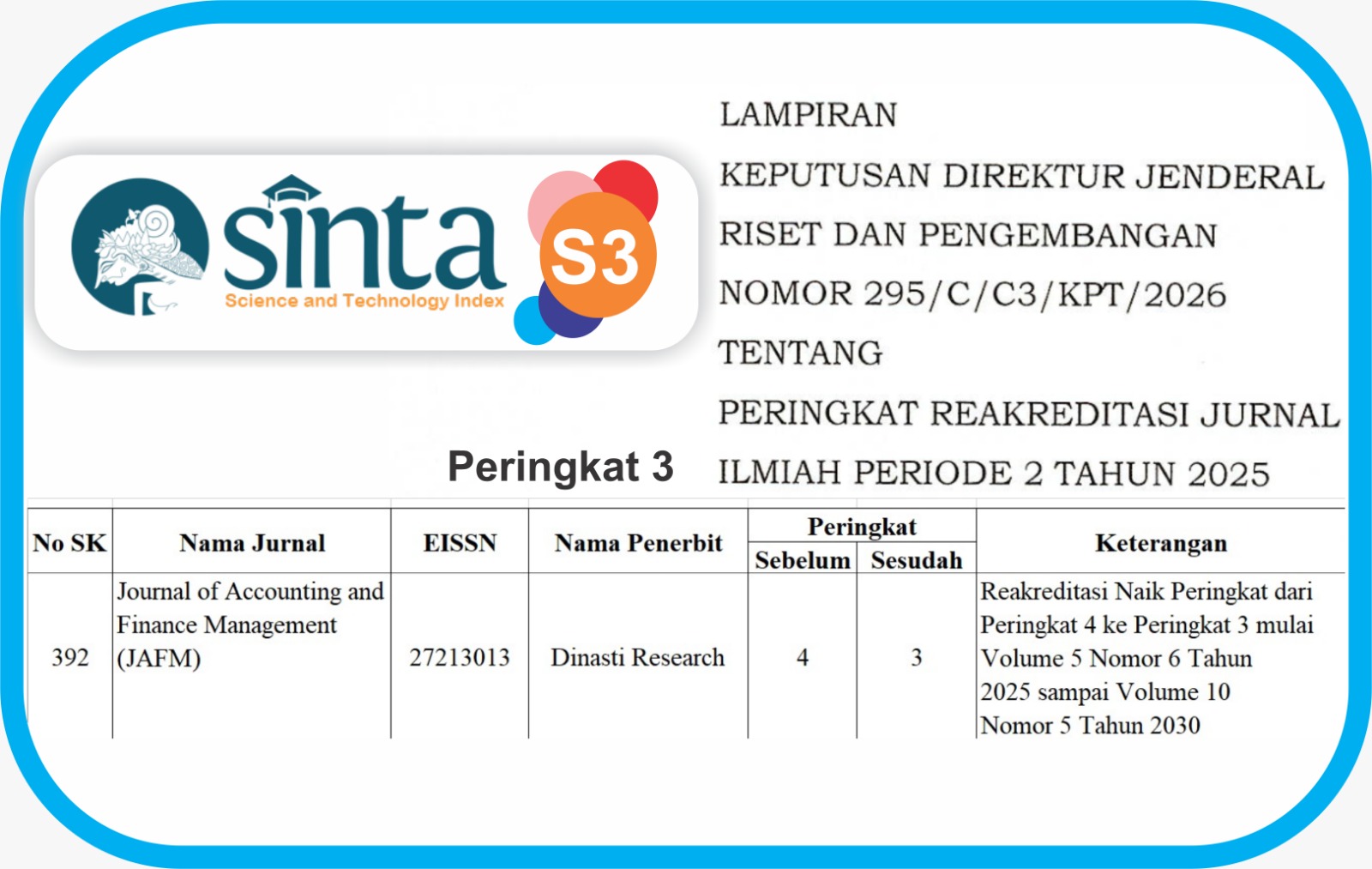Subjective Normsand Entrepreneurship Education Towards Self-Efficacy and Entrepreneurship
DOI:
https://doi.org/10.38035/jafm.v3i6.170Keywords:
Education, Self-Efficacy, Intensi EntrepreneurshipAbstract
Setih Setio Muara Bungo Institute of Administration and Health prepares students to become independent and successful entrepreneurs of the future. The purpose of this research is to clarify whether there is a subjective norm in entrepreneurship education regarding self-efficacy in entrepreneurship among students of the Faculty of Management in the business administration course in the eighth semester. Methods of collecting literature review data and field his research, including interviews, observations, and questionnaires conducted on a student population and her sample of 75 people. The data analysis method used to test the hypotheses in this study is SEM-PLS. As a result of testing the direct influence hypothesis, it was shown that entrepreneurship education has a significant impact on self-efficacy, entrepreneurship education has a significant impact on entrepreneurship, and entrepreneurship education has a significant impact on entrepreneurship. I was. I was. However, subjective norms do not significantly influence entrepreneurial intentions.
References
Azizah, P. (2020). The influence of attitudes, subjective norms, perceptions of behavioral control, and religiosity on entrepreneurial intentions with entrepreneurship education as a moderation variable (Study on FEBI IAIN Salatiga students). Thesis.
Farikhoh, I. (2020). Department of economic education, faculty of economics, semarang state university 2020. 1–88.
Handaru, A. W., Parimita, W., Achmad, A., & Nandiswara, C. (2014). Master of Management Students (Empirical Studies at a State University in Jakarta. Journal of Paramadina University, 11(2), 1046–1061.
Jaya, I., & Seminary, N. (2016). The influence of subjective norms, self-efficacy, and attitudes towards the entrepreneurial intentions of vocational high school students in Denpasar. None, 5(3), 255356.
Mahbubah, S., & Kurniawan, R. Y. (2022). Entrepreneurship Education and the Social Environment Against Entrepreneurial Intentions With Self-Efficacy as a Mediating Variable. Journal of Socioeconomics and Humanities, 8(1), 13–24. https://doi.org/10.29303/jseh.v8i1.1
Mirawati, N. M., Wardana, I. M., & Sukaatmadja, I. P. G. (2016). The influence of attitudes, subjective norms, and perceptions of behavioral control, on the intention of vocational high school students in Denpasar City to become entrepreneurs. E-Journal of Economics and Business, Udayana University, 7(5), 1981–2010. https://ojs.unud.ac.id/index.php/EEB/article/view/16273
Prawoto, E., & Achmad, A. (2020). ENTREPRENEURSHIP AS A MEDIATING VARIABLE (Case Study on FEB UNSIQ Central Java Students in Wonosobo). UNSIQ Journal of Research and Community Service, 8(1), 50–60.
Sons, A. B. H., & Melati, I. S. (2021). The Influence of Entrepreneurial Education, Subjective Norms, and Family Background on Entrepreneurial Intentions through Self-Efficacy of Students of the Faculty of Economics Class of 2017, Semarang State University. Journal of Economic Education and Entrepreneurship, 2(2), 44. https://doi.org/10.31331/jeee.v2i2.1947
Rahmayanti, E. A. (2021). Digital Repository Repository University of Jember Jember University Digital Repository Repository University of Jember Jember. In Digital Repository Jember University.
Santy, N., Rahmawati, T., & Hamzah, A. (2017). The influence of self-efficacy, subjective norms, behavioral attitudes and entrepreneurial education on entrepreneurial intentions. Journal of Business Inspiration and Management, 1(1), 63. https://doi.org/10.33603/jibm.v1i1.481
SerefinaTaruli. (2021). No Title. Book, 1–130.
Attitude, P., Subjective, N., & Education, D. A. N. (n.d.). STUDENT. III(4), 970–979.
Sugiyono. (2015). No Title. In RESEARCH METHODS, quantitative, qualitative and R&D (Alfabeta).
Downloads
Published
How to Cite
Issue
Section
License
Authors who publish their manuscripts in this journal agree to the following conditions:
- The copyright on each article belongs to the author(s).
- The author acknowledges that the Journal of Accounting and Finance Management (JAFM) has the right to be the first to publish with a Creative Commons Attribution 4.0 International license (Attribution 4.0 International (CC BY 4.0).
- Authors can submit articles separately, arrange for the non-exclusive distribution of manuscripts that have been published in this journal into other versions (e.g., sent to the author's institutional repository, publication into books, etc.), by acknowledging that the manuscript has been published for the first time in the Journal of Accounting and Finance Management (JAFM).




























